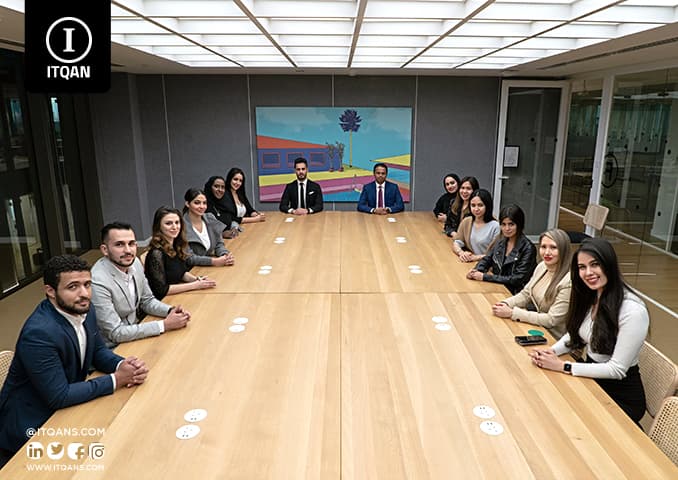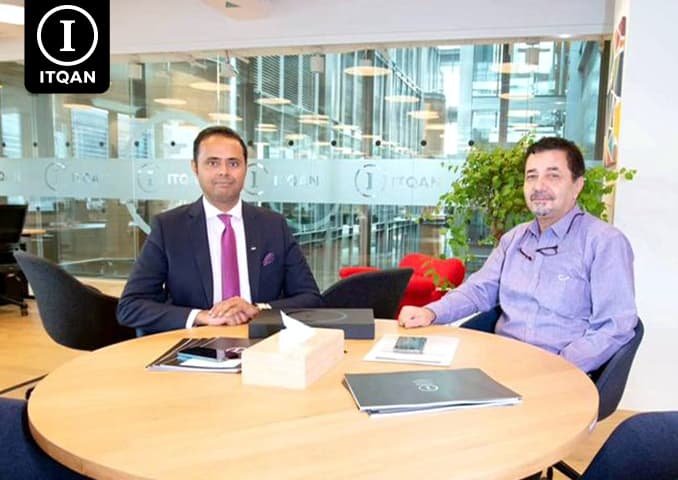Dubai is considered one of the most prominent global destinations for business and investment, providing an ideal environment for startups, medium and large companies alike. Dubai features several free zones that offer unique benefits to businesses, making it an attractive choice for entrepreneurs and investors from all over the world. Establishing a company in the Dubai Free Zone gives you the opportunity to benefit from tax facilities, simplified registration procedures, and a strategic location linking the Asian, European, and African markets.
This article aims to provide a comprehensive guide on how to establish a company in the Dubai Free Zone . In the following sections, we will review the basic steps for choosing the appropriate free zone, the procedures required for registration and licensing, and the best practices for managing and operating the company. Whether you are thinking about establishing a commercial, industrial, or service company, you will find in this guide everything you need to know to achieve the success of your project in Dubai.

Ways to establish a company in the free zone in Dubai
Table of Contents
Choose the appropriate free zone
Choosing the right free zone is a crucial step in the process of establishing a company in Dubai . Free zones in Dubai vary in terms of features, location and types of business activities permitted, making it necessary to carefully evaluate the available options to ensure the company’s business objectives are achieved. In this section, we will discuss the main factors to consider when choosing the right free zone.
Advantages of different free zones
Dubai’s free zones have several advantages that contribute to attracting investors and entrepreneurs from all over the world. The most important of these advantages are:
- Tax exemption: Most free zones provide full tax exemptions on income and profits for periods of up to 50 years, which enhances profitability and reduces operational costs.
- Full Foreign Ownership: Free zones allow foreign investors to fully own their companies without the need for a local partner, providing more control and flexibility in running the business.
- Ease of transferring funds: Companies in free zones enjoy the freedom to transfer profits and capital without restrictions, which facilitates financial operations and provides greater flexibility in international financial transactions.
- Advanced infrastructure: Free zones offer advanced infrastructure that includes equipped offices, warehouses and logistical facilities, which contributes to facilitating the daily operations of companies.
Free zone website
The geographical location of free zones is an important factor to take into consideration when choosing a free zone to establish a company. The following factors play a vital role in decision making:
- Proximity to ports and airports: If the company relies on import and export, proximity to ports and airports can contribute to reducing shipping costs and delivery time.
- Access to local and regional markets: A free zone must be chosen that provides easy access to the target markets, whether local or regional, which contributes to expanding the customer base and increasing sales.
- Logistics facilities: Some free zones provide logistical facilities such as warehouses and integrated logistics centers, which facilitate storage and distribution operations.
Type of business activity
Investors and entrepreneurs must choose a free zone that suits the type of business activity they intend to undertake. Free zones in Dubai vary in terms of permitted commercial activities, so the following must be taken into account:
- Sectoral specialization: Some free zones specialize in certain sectors such as technology, media, financial services, or heavy industries. A free zone must be chosen that is appropriate to the sector to which the company belongs.
- Required licenses: The required licenses and certificates vary from one free zone to another depending on the type of business activity. Therefore, it is necessary to ensure that the chosen free zone provides the necessary licenses to conduct the activity legally and smoothly.
- Competition and business opportunities: The local market in the targeted free zone must be studied to determine the level of competition and business opportunities available. Some free zones can be more attractive due to greater opportunities for growth and expansion.
Registration and licensing procedures in the Dubai Free Zone
Registration and licensing procedures are considered one of the most important steps for establishing a company in the Dubai Free Zone . Without obtaining the necessary licenses, the company will not be able to start its operations. This section includes an explanation of the basic steps, required documents, costs, and expected timetable for completing the registration process.
Required Documents
When applying to register a company in the free zone, you will need to submit a set of basic documents. These documents vary slightly depending on the type of business and the free zone chosen, but generally include:
- Copies of passports of founders and shareholders: Clear and valid copies of passports must be provided for all individuals involved in establishing the company.
- Business Plan: A detailed business plan must be submitted that explains the company’s goals and future plans.
- Registration application form: The registration application form is filled out, which can be obtained from the free zone’s website or from their offices.
- Proof of Address: Proof of the current address of the founders and shareholders must be provided, whether in the UAE or abroad.
- No-objection letter: In some cases, you may need a no-objection letter from your current sponsor if you are residing in the UAE and working under sponsorship.
Fees and costs
Fees and costs vary based on the type of business and free zone chosen, but generally include:
- Registration fees: These are the fees paid when submitting a registration application, and they vary according to the free zone.
- License fees: This includes the cost of obtaining a commercial license, which varies according to the type of business activity.
- Rental fees: If you are leasing an office or space in a free zone, there will be an annual rental fee.
- Additional Services Fees: These may include costs for additional services such as opening a bank account, obtaining work visas, and other services.
Registration schedule
The timeline for completing the registration process varies depending on the free zone and type of business activity, but in general it can be divided into the following stages:
- Submission of documents and initial examination: This stage usually takes 1 to 3 business days.
- Application review and initial approval: This stage may take 5 to 10 working days, as the authorities review the application and documents submitted.
- License issuance: After the application is approved, the commercial license is issued, which may take an additional 5 to 7 working days.
- Post-licensing procedures: This stage includes opening the bank account, obtaining work visas, and renting the office, which may take from two weeks to a month.
In this way, business owners can establish their companies in the free zones in Dubai easily and conveniently, allowing them to benefit from the many advantages that these zones provide.
Management and operation of the company in the free zone in Dubai
Effectively managing and operating a company in the Dubai Free Zone requires a deep understanding of several vital aspects including recruitment, financial management, and marketing. Here we will discuss each of these aspects in detail:
Recruitment and human resources
When establishing a company in a free zone, recruitment is one of the first important steps to ensure successful operations. Dubai’s free zones provide an attractive work environment that facilitates attracting talent from around the world. Companies must comply with local regulations and laws related to employment, including obtaining the necessary work permits and visas for employees.
- Selection of employees: The company’s needs for competencies and talents must be determined in accordance with the nature of the business activity. Recruitment offices can be used or advertised via electronic recruitment platforms.
- Training and development: To ensure the efficiency and effectiveness of work, it is preferable to provide periodic training programs for employees, which enhances their skills and ability to achieve the company’s goals.
- Payroll and benefits management: An integrated payroll and benefits management system must be set up that is in line with local laws and motivates employees to perform optimally.
Financial and banking accounts
Financial accounts management is the backbone of any business, and requires careful planning and organization to ensure business sustainability.
- Opening a bank account: One of the basic procedures for new companies is to open a bank account in one of the recognized banks in the free zone. This account will facilitate payments and financial collections.
- Preparing the company’s budget: The company must prepare an annual budget that specifies expected revenues and expenses, which helps organize financial resources and avoid financial deficits.
- Financial audit: To ensure transparency and credibility, independent financial auditors must be used to conduct a periodic audit of the company’s financial accounts.
sales and marketing
Effective marketing is the key to attracting customers and achieving sales, and must be an integral part of the company’s strategy.
- Developing a marketing plan: The marketing plan includes identifying the target audience, developing strategies to promote products or services, and determining the appropriate budget for marketing operations.
- Leverage digital means: In today’s digital age, social media and websites are effective tools to reach customers. The company should invest in developing an integrated website and using social media effectively.
- Market and competitor analysis: To understand market requirements and achieve a competitive advantage, periodic studies of the market must be conducted and competitors’ performance analyzed, which helps in adjusting marketing strategies to suit changes in the market.
In conclusion, establishing a company in the Dubai Free Zone can be an excellent strategic move to achieve long-term success in the global business market. By choosing the right free zone that matches your type of business and exploiting the unique advantages these zones offer, companies can achieve sustainable growth and effectively expand their operations.
The registration and licensing process requires some effort and planning, as the required documents must be provided and the specified timetable must be adhered to, in addition to taking into account the fees and costs related to the establishment process. Although these steps may seem complicated at first, they form a solid foundation for your company’s long-term success.
Managing and operating a company in a free zone requires special attention to aspects of recruitment and human resources, as well as financial and banking accounts to ensure efficient continuity of operations. In addition, effective marketing strategies must be adopted to boost sales and reach the target audience.
In conclusion, establishing a company in the Dubai Free Zone provides multiple opportunities for growth and expansion thanks to the flexible business environment and advanced infrastructure. By following the above steps and procedures, you can build a strong foundation for your company and achieve success in one of the most dynamic markets in the world.
The most important frequently asked questions about establishing a company in the Dubai Free Zone
What are the advantages of establishing a company in the Dubai Free Zone?
The advantages of establishing a company in Dubai free zones include tax exemptions, 100% foreign ownership, no need for a local partner, ease of establishment procedures, and access to advanced infrastructure.
What types of companies can be established in the Dubai Free Zone?
Different types of companies can be established in free zones, such as limited liability companies (LLC), investment companies, trading companies, and consulting companies.
What are the costs associated with setting up a company in the Dubai Free Zone?
Costs include establishment fees, licensing fees, office or office space rental costs, and administrative services costs. These costs can vary based on the type and size of the company.
Is it possible to obtain work and residence visas in the Dubai Free Zone?
Yes, work and residence visas can be obtained for investors and employees in the free zones in Dubai. The visa process requires submitting documents proving investment and providing suitable jobs.
What are the procedures necessary to register a trademark in the Dubai Free Zone?
To register a trademark, you must submit an application to the free zone administration, pay the prescribed fees, and submit documents such as certificates and intellectual property. You may also need to check the availability of the trademark and submit a formal application for registration.

















